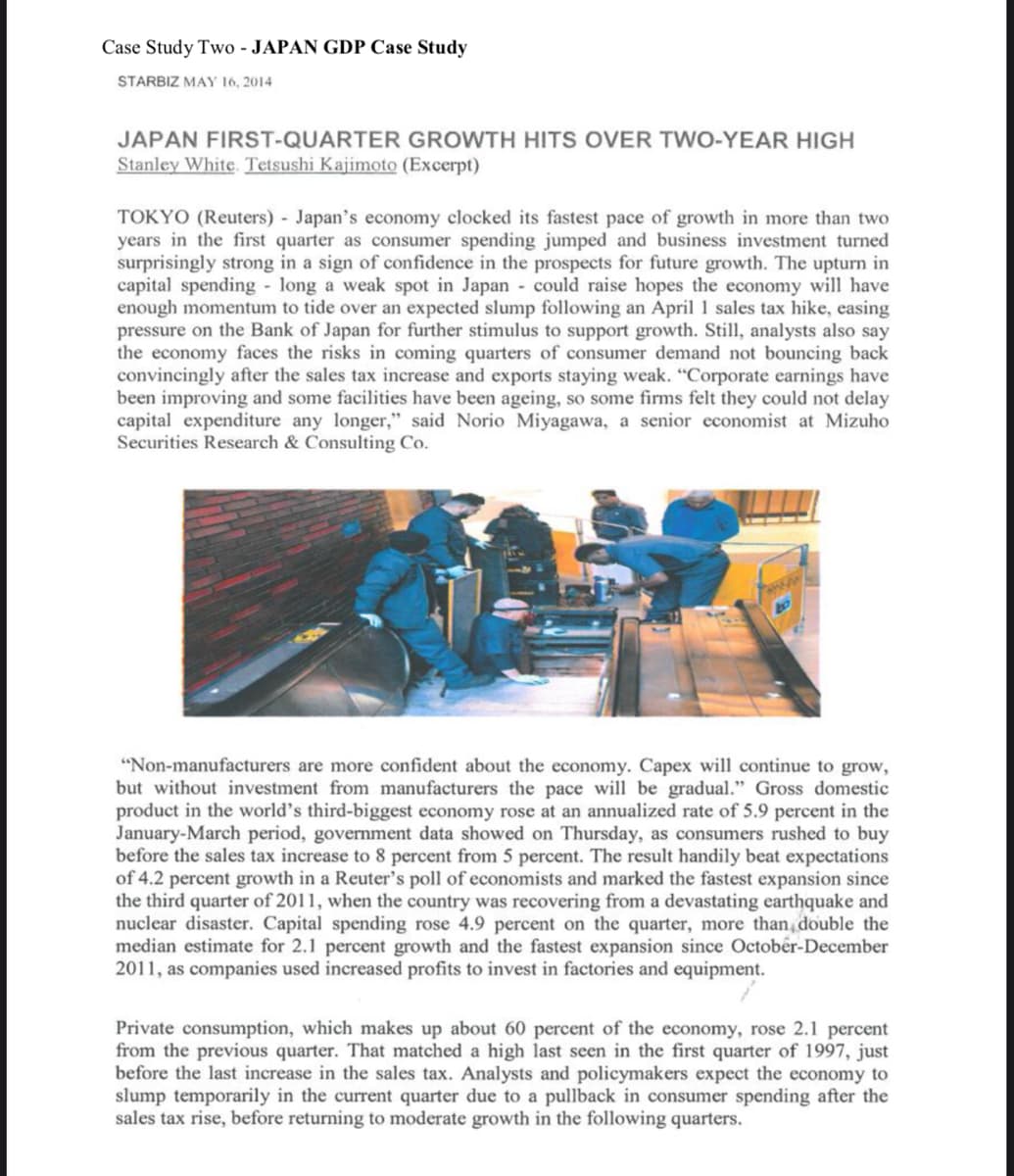In the above case study, identify TWO factors that are responsible for the rise in Japan's Gross Domestic Product (GDP) 1. 2. Critically evaluate the impending rise of sales tax planned by the Japanese government and its effect on the demand and eventually public spending
In the above case study, identify TWO factors that are responsible for the rise in Japan's Gross Domestic Product (GDP) 1. 2. Critically evaluate the impending rise of sales tax planned by the Japanese government and its effect on the demand and eventually public spending
Chapter1: Making Economics Decisions
Section: Chapter Questions
Problem 1QTC
Related questions
Question

Transcribed Image Text:In the above case study, identify TWO factors that are responsible for the rise
in Japan's Gross Domestic Product (GDP)
1.
2. Critically evaluate the impending rise of sales tax planned by the Japanese
government and its effect on the demand and eventually public spending

Transcribed Image Text:Case Study Two - JAPAN GDP Case Study
STARBIZ MAY 16, 2014
JAPAN FIRST-QUARTER GROWTH HITS OVER TWO-YEAR HIGH
Stanley White. Tetsushi Kajimoto (Excerpt)
TOKYO (Reuters) - Japan's economy clocked its fastest pace of growth in more than two
years in the first quarter as consumer spending jumped and business investment turned
surprisingly strong in a sign of confidence in the prospects for future growth. The upturn in
capital spending - long a weak spot in Japan could raise hopes the economy will have
enough momentum to tide over an expected slump following an April 1 sales tax hike, easing
pressure on the Bank of Japan for further stimulus to support growth. Still, analysts also say
the economy faces the risks in coming quarters of consumer demand not bouncing back
convincingly after the sales tax increase and exports staying weak. "Corporate earnings have
been improving and some facilities have been ageing, so some firms felt they could not delay
capital expenditure any longer," said Norio Miyagawa, a senior economist at Mizuho
Securities Research & Consulting Co.
"Non-manufacturers are more confident about the economy. Capex will continue to grow,
but without investment from manufacturers the pace will be gradual." Gross domestic
product in the world's third-biggest economy rose at an annualized rate of 5.9 percent in the
January-March period, government data showed on Thursday, as consumers rushed to buy
before the sales tax increase to 8 percent from 5 percent. The result handily beat expectations
of 4.2 percent growth in a Reuter's poll of economists and marked the fastest expansion since
the third quarter of 2011, when the country was recovering from a devastating earthquake and
nuclear disaster. Capital spending rose 4.9 percent on the quarter, more than, double the
median estimate for 2.1 percent growth and the fastest expansion since October-December
2011, as companies used increased profits to invest in factories and equipment.
Private consumption, which makes up about 60 percent of the economy, rose 2.1 percent
from the previous quarter. That matched a high last seen in the first quarter of 1997, just
before the last increase in the sales tax. Analysts and policymakers expect the economy to
slump temporarily in the current quarter due to a pullback in consumer spending after the
sales tax rise, before returning to moderate growth in the following quarters.
Expert Solution
This question has been solved!
Explore an expertly crafted, step-by-step solution for a thorough understanding of key concepts.
This is a popular solution!
Trending now
This is a popular solution!
Step by step
Solved in 3 steps

Follow-up Questions
Read through expert solutions to related follow-up questions below.
Follow-up Question
Critically evaluate the impending rise of sales tax planned by the Japanese government and its effect on the demand and eventually public spending
Solution
Knowledge Booster
Learn more about
Need a deep-dive on the concept behind this application? Look no further. Learn more about this topic, economics and related others by exploring similar questions and additional content below.Recommended textbooks for you


Principles of Economics (12th Edition)
Economics
ISBN:
9780134078779
Author:
Karl E. Case, Ray C. Fair, Sharon E. Oster
Publisher:
PEARSON

Engineering Economy (17th Edition)
Economics
ISBN:
9780134870069
Author:
William G. Sullivan, Elin M. Wicks, C. Patrick Koelling
Publisher:
PEARSON


Principles of Economics (12th Edition)
Economics
ISBN:
9780134078779
Author:
Karl E. Case, Ray C. Fair, Sharon E. Oster
Publisher:
PEARSON

Engineering Economy (17th Edition)
Economics
ISBN:
9780134870069
Author:
William G. Sullivan, Elin M. Wicks, C. Patrick Koelling
Publisher:
PEARSON

Principles of Economics (MindTap Course List)
Economics
ISBN:
9781305585126
Author:
N. Gregory Mankiw
Publisher:
Cengage Learning

Managerial Economics: A Problem Solving Approach
Economics
ISBN:
9781337106665
Author:
Luke M. Froeb, Brian T. McCann, Michael R. Ward, Mike Shor
Publisher:
Cengage Learning

Managerial Economics & Business Strategy (Mcgraw-…
Economics
ISBN:
9781259290619
Author:
Michael Baye, Jeff Prince
Publisher:
McGraw-Hill Education